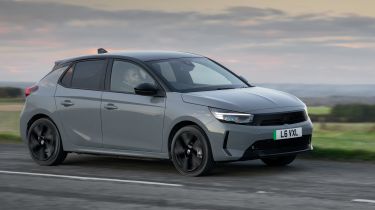Vauxhall Corsa Electric: performance, motor & drive
The plug-in Corsa is easy to drive and its electric motor has a surprising amount of poke
| Model | 0-62mph | Top speed | Driven wheels | Power |
| 50kWh | 8.2s | 93mph | Front | 134bhp |
| 51kWh | 8.2s | 93mph | Front | 154bhp |
On the road, the Vauxhall Corsa Electric, unsurprisingly, feels quite similar to its closely related sister car, the Peugeot E-208. That means it offers a decent amount of performance and drives in a direct and predictable manner. On the downside, the addition of the 345kg battery pack means the chassis and suspension are a little stiffer than those of a petrol-powered Corsa, resulting in a bouncier ride.
Vauxhall Corsa Electric 0-62mph, top speed and acceleration
Like lots of small electric cars, the Corsa Electric’s instant torque makes it feel particularly peppy – much more so than its petrol or diesel equivalents. It’s quite telling that much of Vauxhall’s marketing material quotes the Corsa’s 0-30mph time of just 2.8 seconds – in other words, it's really quite quick away from the lights.
But it doesn’t stop there; the Vauxhall Corsa Electric is available with two power outputs – 134bhp or 154bhp – and both versions boast a swift 0-62mph time of under nine seconds.
It’s worth noting, however, that the additional 20bhp of the 154bhp model is only unlocked when you put the car into its ‘Sport’ setting; this doesn’t only boost throttle response, but also adds weight to the steering to make the car more involving to drive. At the other end of the spectrum is ‘Eco’ mode, which limits power to just 81bhp to eke as much out of the Corsa’s battery as possible.
As with most electric cars, things start to tail off in the Corsa at 70mph or so, but for typical UK commuters, the Vauxhall’s performance should be more than adequate. A 93mph top speed won’t trouble sports cars, but it’s sufficient for those who regularly use their car on the motorway.
Handling
By building the Corsa on same base as the Peugeot 208, Vauxhall has worked wonders for the car’s handling. While the steering is light and there isn’t much in the way of feedback, it’s precise, giving the car a predictable feel. There’s plenty of grip, and body control is good, given the added weight of the battery.
One downside is that the Corsa Electric’s slightly stiffer suspension means it bounces about a bit more than the petrol car. The ride is never brittle, though; you rarely feel shocks reverberate around the cabin, resulting in a relatively comfortable driving experience overall.
Refinement is excellent. The electric motor means the only notable sound is a bit of tyre noise, although it’s pretty well suppressed, so long motorway miles are no hardship. During testing, we had to press the pedal quite hard before we felt the brakes kick in but, once they do, the two-stage regenerative braking works rather well. We wish the ‘B’ mode setting was stronger, though, because this doesn’t come close to offering full one-pedal driving.




